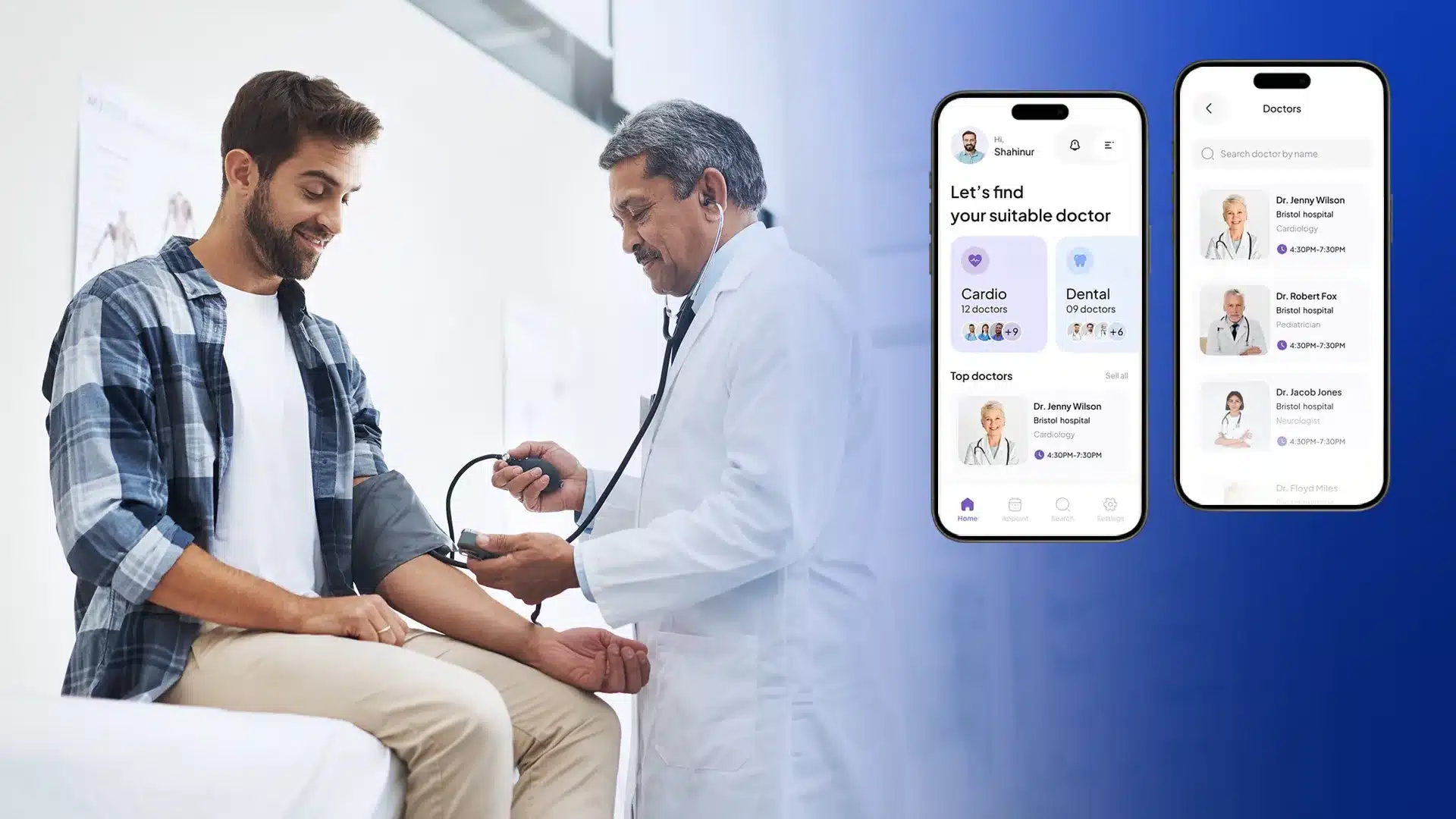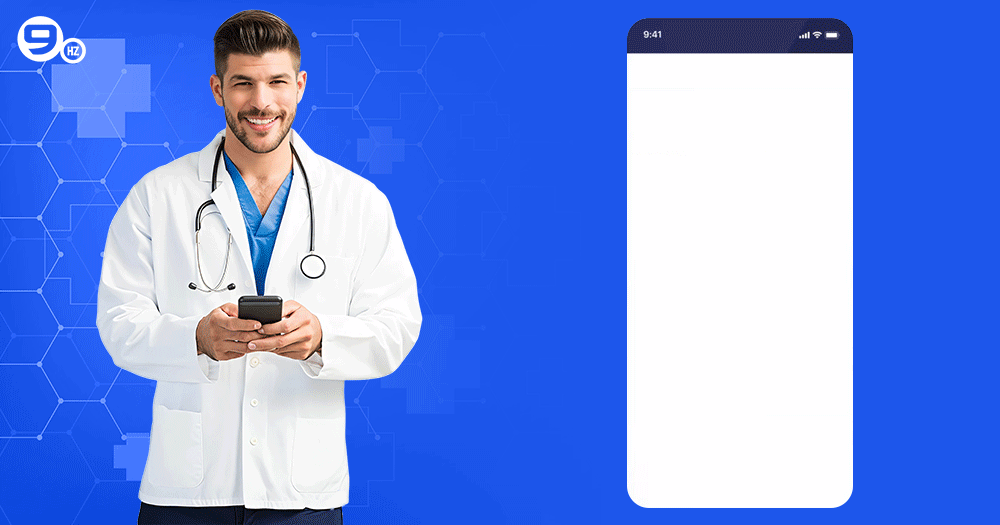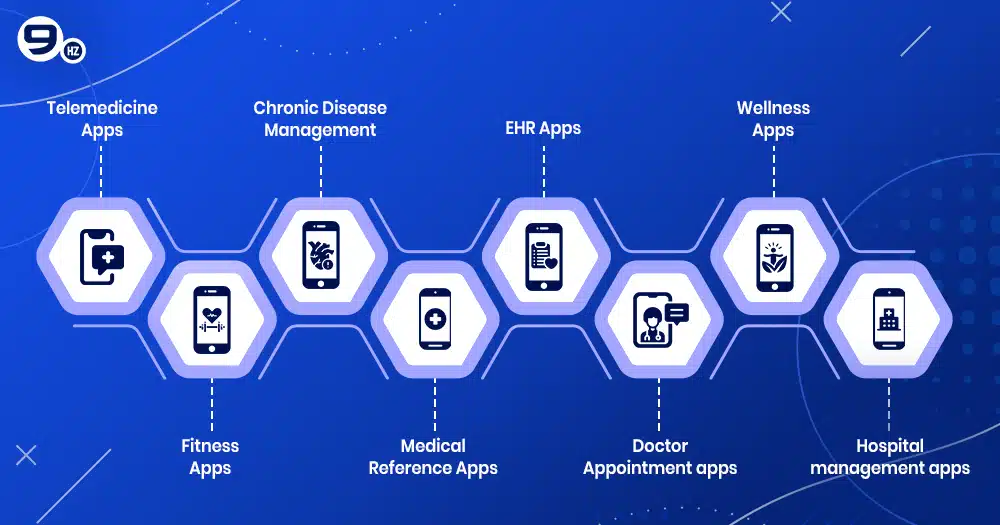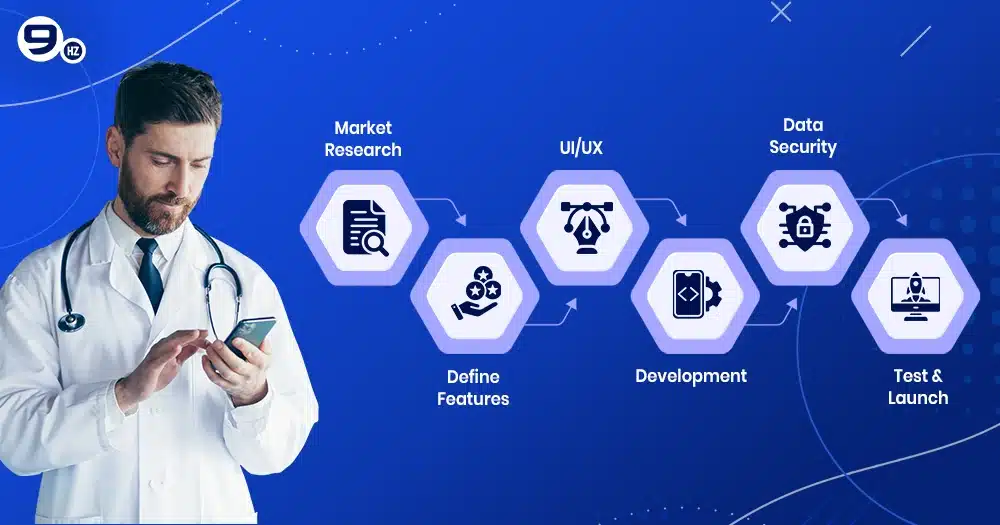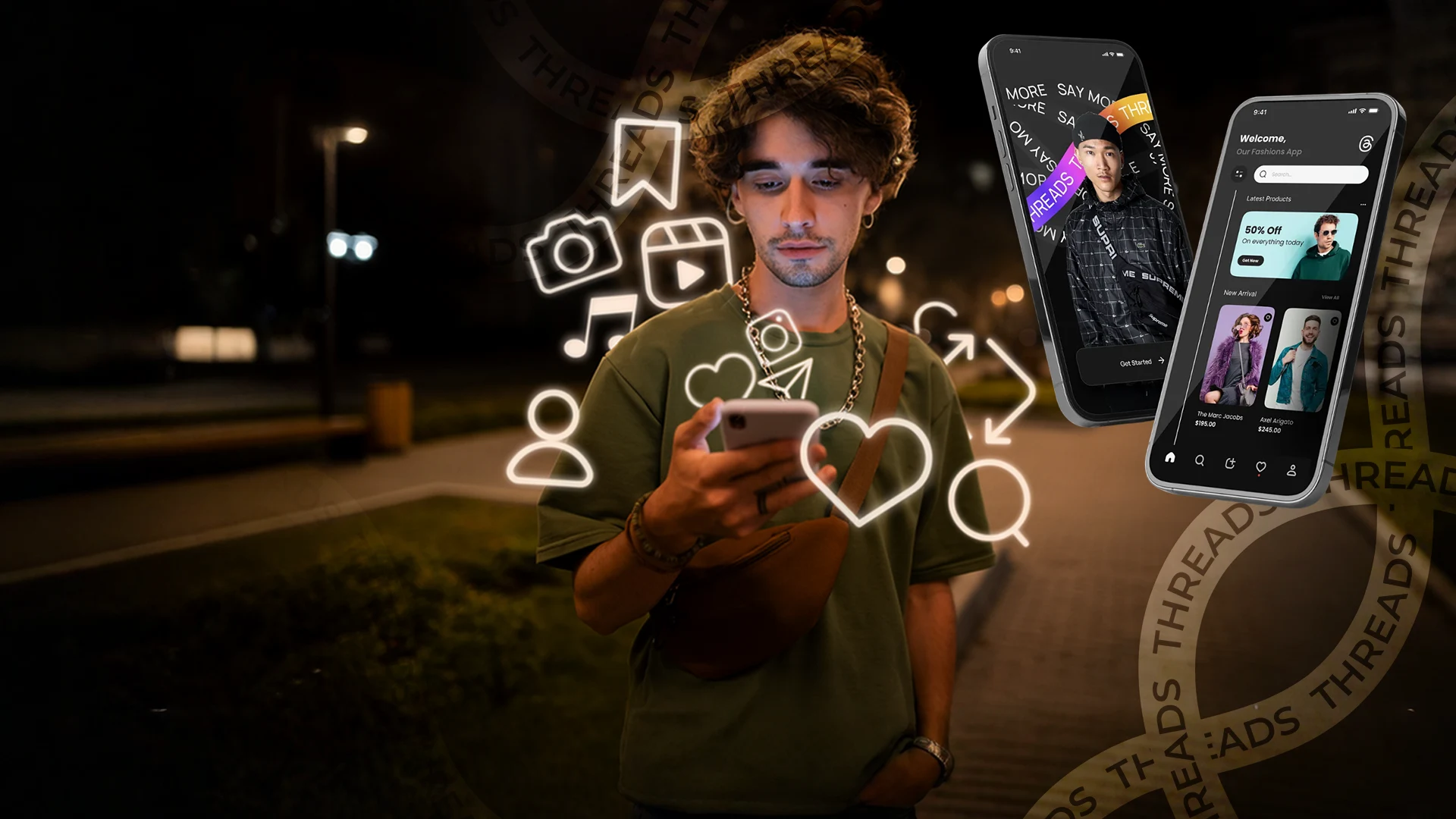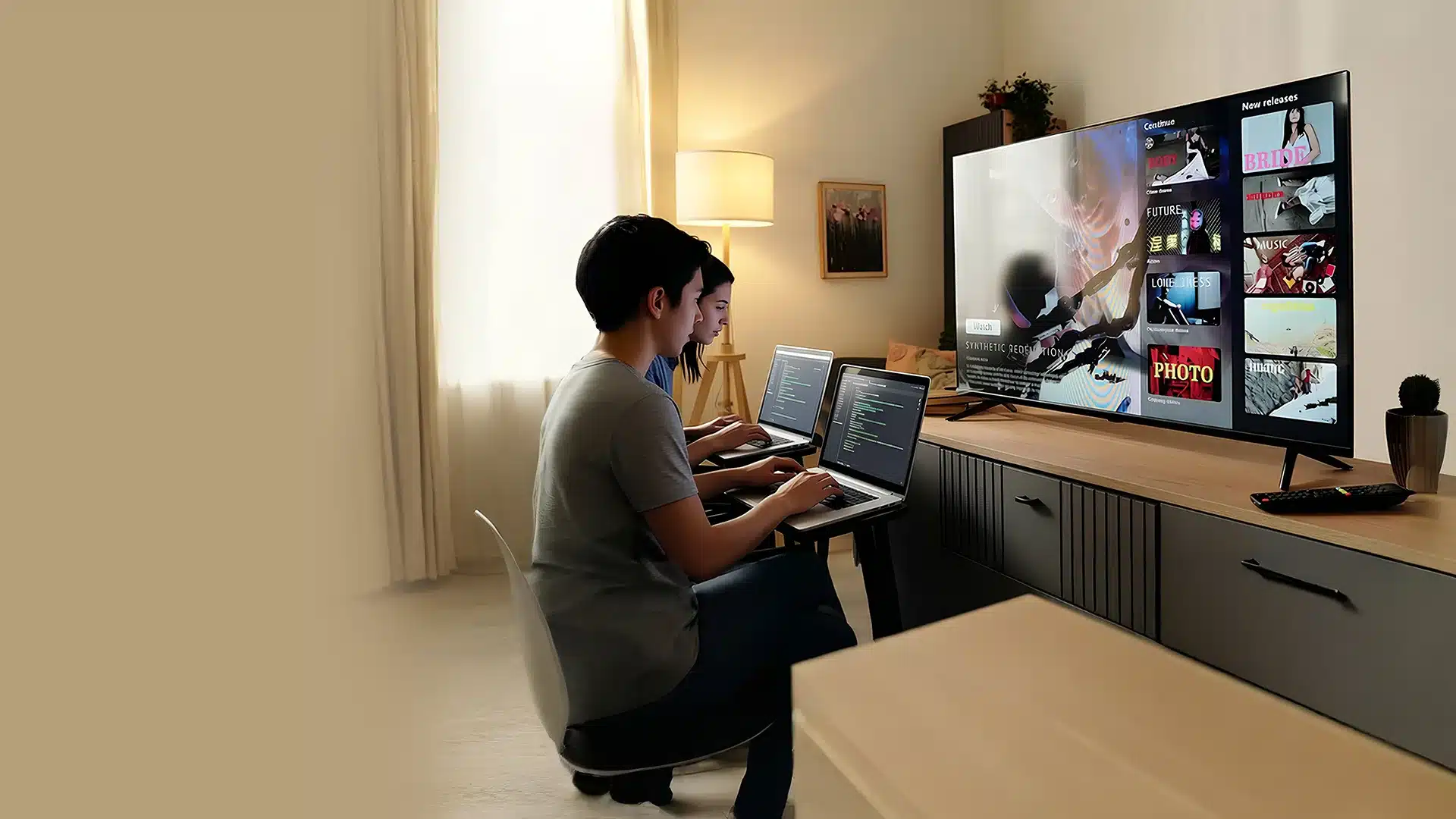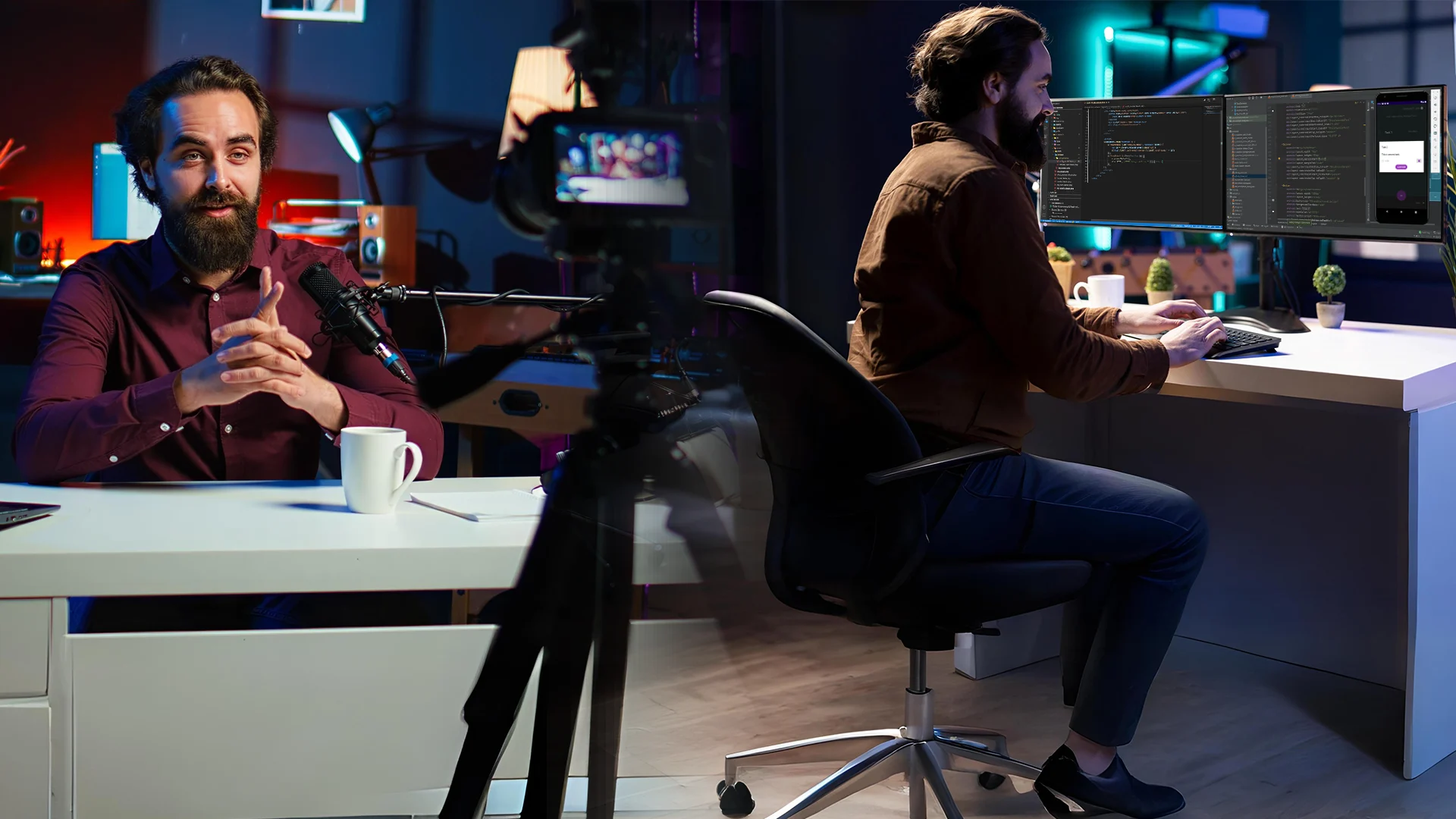Have you ever imagined a world where consulting a doctor, scheduling medical tests, or even managing a chronic condition can all be done in your pyjamas on a smartphone app?
Seems like science fiction, but this is the world we live in today! The healthcare industry is being reshaped digitally, and healthcare mobile app development is leading the charge. Telemedicine, fitness, wellness, and so on, medical apps are changing how we interact with the healthcare system and making healthcare more accessible, convenient, and personalized.
In a report cited by Grand View Research, the mHealth (mobile health) market is expected to reach $243.57 billion globally by the year 2030, growing at a compound annual growth rate (CAGR) of 11.6% from 2023 and thereafter. The staggering growth substantiates the increasing demand for mobile health solutions that improve care for patients and enhance healthcare delivery.
If you’re looking to develop a healthcare mobile app to promote telemedicine, fitness tracking, or hospital management, knowing the process, necessary requirements, features and costs required to build a healthcare mobile app can help you build a successful app. This comprehensive guide will walk you through everything you need to know to create a healthcare mobile app that stands out in the competitive health tech market. If you are looking for a custom mobile app development, The NineHertz is the leading healthcare app development company.
What is a Healthcare App?
A health care app is a smartphone application for the consumer to use to manage their health, access their medical providers, and access healthcare easily. Health care apps utilize technology to allow people to have access to critical health-care services, such as tele-consultations with health care providers, prescription management, fitness tracking, and maintaining and managing personal health records, at their fingertips.
The purpose of the app is to enhance the quality of service and facilitation of health management by making it easier for the patient, doctor, and health care provider at large. The health care app provides a systematic, methodical way to deliver health services to users, while providing an option to in-person health care forms of delivery.
Each health care app can be placed into three categories, each serving different needs:
- Patient-Centric Apps: Patient-centric apps are designed to assist individual users in managing their health, their fitness goals, and facilitate remote consultation with doctors and health care providers.
- Doctor-Centric Apps: Doctor-centric apps are designed to help healthcare professionals improve the quality of care, maintain patient medical records and plan appointments.
- Institution-Centric Apps: Institutional apps are designed specifically to manage the operations of the hospital or clinic, by managing patient flow, and the infrastructure to deliver health care.
In the following sections, we’ll delve deeper into the various types of healthcare apps and the distinct advantages they provide to various stakeholders in the healthcare ecosystem.
Benefits of Healthcare mobile App Development
The rise of custom mobile app development services has brought many new positive features to the healthcare landscape that are advantageous to patients, doctors, and institutions in easily obtaining, tracking, and administering medical services. Let’s look at the advantages for each group:
1. Benefits for Patients
Convenience and Accessibility
Healthcare mobile apps allow patients to consult doctors, set up video appointments, order prescriptions and medications, and even track their health concerns from home. This convenience, especially important to individuals with mobility concerns or who live in remote areas of a country, provides valuable access that patients may have never had.
Improved Health Monitoring
With healthcare tracking apps, patients can manage their vital signs, track fitness levels or progress, keep track of medication schedules, and even manage chronic conditions and illnesses like diabetes and hypertension. This use of real-time data translates into actionable insight as users can approach and decide on the right actions for better health.
Instant Access to Medical Information
Patients who have healthcare apps that allow patient-centric health information can access their medical records, lab results, and documentation of medication wherever and whenever they choose. Their access to this information helps individuals make informed decisions and remain on top of their health.
Cost Savings
Virtual consultations and remote monitoring can save money from in-person visits that are often costly and take time. Additionally, preventative care provided by health monitoring apps can result in fewer emergencies, saving the emergency healthcare costs altogether.
2. Benefits for Doctors
Streamlined Communication with Patients
Healthcare mobile app development provides doctors with more advanced options to communicate with patients. With in-app messaging, video consultations, and appointment reminders, doctors can communicate in real-time with patients, reducing potential delays and improving patient care.
Access to Comprehensive Medical Data
Doctors now have access to a patient’s entire medical history, including health data, lab results, and lists of medications with EHR (Electronic Health Records) apps. Access to patient data enables doctors to make better diagnoses and more appropriate treatment plans.
Time Efficiency
Doctors can save more time with the automatic scheduling, reminders, and patient intake forms on their healthcare apps so that they can spend time focusing on patients instead of administrative duties.
Enhanced Decision-Making
Some healthcare apps use AI and data analytics to help doctors’ predictive capabilities and provide better decision-making tools. These functions could potentially help healthcare providers diagnose conditions sooner and suggest more relevant treatment options.
3. Benefits for Healthcare Institutions
Operational Efficiency
Mobile healthcare applications can enhance a hospital or clinic’s internal operations, from patient scheduling to staff utilization. With features like app check-ins, real-time availability of rooms, and electronic information, the administrivia is reduced, and the workflow becomes more efficient.
Better Patient Care
Utilizing better communication tools, remote patient monitoring, and real-time updates allows hospitals to create better care coordination around their patients. Being able to measure a patient’s condition in a non-traditional manner allows for better outcomes and quicker intervention, if necessary.
Cost Efficiency
Healthcare applications permit institutions to be more cost-effective by minimizing administrative manual handling, reducing in-person patient visits, and allowing better resource allocation. Institutions can also reach more patients through telemedicine services with no added cost to physical infrastructure.
Data Analytics and Reporting
Healthcare applications will provide institutions with actionable data analytics that can be leveraged to increase operations, patient satisfaction and clinical outcomes. Observing patient interactions and care patterns leads to better identification of practices that can be fine-tuned to higher care delivery.
Types of Healthcare Mobile Apps
With healthcare mobile app development, the opportunities are numerous, as there are so many different types of apps that meet different needs for patients, doctors, and healthcare institutions. Below, we discuss the main categories of healthcare apps and what they do.
| Healthcare App Type | Target Users | Main Features |
|---|---|---|
| Telemedicine Apps | Patients, Doctors | Virtual consultations, medical advice, prescription refills |
| Fitness and Wellness Apps | General Public, Patients | Activity tracking, nutrition logs, and workout plans |
| Chronic Disease Management | Patients with chronic conditions | Symptom tracking, medication reminders, and health monitoring |
| Medical Reference Apps | Doctors | Medical literature, drug references, and clinical guidelines |
| EHR Apps | Doctors, Hospitals | Patient records, medical history, and lab results |
| Appointment Scheduling Apps | Doctors, Patients | Appointment booking, reminders, and schedule management |
| Hospital Management Apps | Healthcare Institutions | Patient management, billing, staff scheduling, and inventory |
| Remote Monitoring Systems | Healthcare Institutions, Patients | Vital signs tracking, remote consultations |
1. Patient-Centric Apps
Patient-centric apps provide tools for the user to manage their health, as well as options for tracking wellness, remotely communicating with doctors, and managing their health records. Common uses of patient-facing apps include:
Telemedicine Apps
Telemedicine apps allow patients to have real-time virtual consultations with their healthcare provider. They may use this for a general consultation or a specialist appointment. Telemedicine apps allow healthcare to be more accessible for those who have difficulty traveling to a doctor’s office or need immediate advice.
Fitness and Wellness Apps
Fitness and wellness apps can be used by patients to track their physical activities, meals and general health. Some well-known brands such as MyFitnessPal and Fitbit allow patients to set fitness goals, track caloric intake and facilitate workout logging. If you want to launch your own fitness application, The NineHertz is the best fitness app development company.
Chronic Disease Management Apps
Management apps are developed with a specific need. They are generally designed for patients with a chronic condition like diabetes, high blood pressure, or asthma. They allow the patient to track symptoms, medications and doctor visits, and send reminders for medication compliance.
2. Doctor-Centric Apps
Doctor-centric apps are specifically designed for healthcare professionals. These apps have tools to support patient information management, enhanced consultations, and continuing education. The major types include:
Medical Reference Apps
These apps provide doctors access to vast databases in medical literature, drug references, clinical or treatment guidelines, etc. These are super helpful apps to use for quick decision-making.
EHR (Electronic Health Record) Apps
EHR applications host patient health records in a digital format. These applications allow physicians to easily access patient histories, previous laboratory results, or other medical documentation. These applications make it easier for physicians to make clinical decisions and improve accuracy.
Appointment Scheduling Apps
Doctors can use mobile applications to view their calendars, and patients can use the applications to book, reschedule, or cancel an appointment. Some applications also send appointment reminders and reduce the level of missed appointments. We are the leading doctor appointment app development company to build such applications.
3. Institution-Centric Apps
Healthcare organisations also utilize mobile and web apps that aid in managing their activities, delivering care, and improving the patient experience. The most common types of institution-centered mobile apps include:
Hospital Management Apps
These apps allow hospitals to manage day-to-day activities, including patient admissions, patient billing, staffing and scheduling, and inventory management. They improve operational efficiency and ensure a better run of the healthcare organisation.
Remote Patient Monitoring Systems
These apps are used to monitor patients from a distance through updates on vitals, medication compliance, and progress. This is particularly helpful for patients with chronic comorbidities who need function checks regularly but are not always able to visit a clinic.
Features to Include in a Healthcare App
When you decide to develop a healthcare app, the app’s features will ultimately determine its success. An intuitive design with meaningful and usable functionalities improve patient engagement while allowing healthcare staff to operate effectively. Let’s break this down into must-have, advanced, and admin-side features.
I. Must-Have Features
When you start to build a healthcare app, these core features are non-negotiable. They form the foundation of any functional healthcare mobile solution.
1. User Registration & Profile Management
Your app must provide an easy and secure login. Both patients and doctors should be able to register or log in via email or phone numbers, social login options and access and manage their personal login data, health history, and preferences within the app.
2. Appointment Booking
An appointment system built within your application makes it easy for users to check doctor availability and to book, reschedule, and cancel consultations.
3. Video Consultation
This is a must-have feature for telehealth or a patient and doctor app. Video consultation enables healthcare providers and patients to engage virtually, in real time, eliminating the need for in-person visits when they’re not necessary.
4. Secure Messaging
Secure message exchange between patients and doctors adds to patient engagement while providing another avenue for communication, while protecting secure information.
II. Advanced Features
While you create a healthcare app, you can add the following advanced features to gain a competitive presence in the marketplace.
1. AI Symptom Checker
An AI-enabled symptom checker can provide users with preliminary insight regarding their health based on the data they enter. A symptom checker does not replace a doctor, it helps triage the patient’s concerns.
2. Integration with Wearables
Today’s healthcare depends on real-time health data. Integrating applications with user apps such as Fitbit, Apple Watch, or medical-grade wearables allows patients and doctors to monitor heart rate, sleep, activity levels, and other health metrics from the app.
3. Real-Time Analytics
Real-time health analytics enable users to monitor trends, identify patterns, and make informed assessments, whether for patient health monitoring or institutional use.
III. Admin Panel Features
When you develop a healthcare app, you cannot ignore the admin side. A well-designed admin panel will streamline administration and management.
1. User Management
Admins should be able to verify, edit or deactivate user accounts, as well as manage roles, whether it be as a patient, doctor or support staff.
2. Doctor Onboarding
Allow healthcare admins to onboard verified doctors! The admin panel should allow credential validation, as well as approvals and profile management.
3. Analytics Dashboard
The admin panel must offer a bird’s-eye view of user activity, consultations, revenue flow, and app performance, helping institutions optimize services and ensure regulatory compliance.
Pro Tip: Focus on creating an intuitive user experience while balancing security, especially in healthcare, where sensitive patient data is involved.
How to Develop a Healthcare Mobile App? – Step by Step
Are you planning to build a healthcare app that stands out in today’s competitive market? Whether you are an entrepreneur, a hospital, or a healthcare startup, the best way to ensure that you will be successful in app development is to follow a proven, strategic development plan. Here is a step-by-step process for your healthcare app that will satisfy both user and industry standards.
Step 1: Conduct Market Research & Identify User Needs
Thorough user research is critical before you create a healthcare app. You must understand the target audience- patients, healthcare providers, or institutions. You also should define which specific problems your app will eliminate. Conduct interviews, surveys, and competitors’ research to validate your concept.
Step 2: Define Features and Technical Specifications
Once the core problem is understood, create a detailed list of features and functionalities for your app. This is also where you determine whether you want a healthcare mobile app development for iOS or Android, or both. You need to document your tech requirements so that the business and development teams can work more seamlessly.
Step 3: Design User-Centric UI/UX
A user-friendly design is mandatory when you develop a healthcare app. The user experience must be simple, smooth, and accessible for all users of different ages and backgrounds who may not be familiar with technology. Mockups and prototypes at this stage help stakeholders and users visualize the final product.
Step 4: Develop the App (Front-end & Back-end)
This is where you’ll start to code, and your app will come to life. Trust the frameworks that are established and use secure coding practices. Your healthcare mobile app development team should make sure that the front-end (user-facing) and the back-end (server, database, APIs) are well integrated and working accordingly.
Step 5: Ensure Regulatory Compliance & Data Security
Healthcare apps have access to sensitive information, so there are rules and regulations that you must follow. It is important to ensure that your app observes the regulations set out for data protection. Whether you are designing it for the U.S., EU, or globally, standards like HIPAA, GDPR, and HL7 must be followed.
Step 6: Test, Launch, and Iterate
Before launching your app, thoroughly test it — usability tests, security tests, performance tests– to ensure that your mobile app runs smoothly. Once the app has been launched, you should continually review user feedback and push out updates to improve the user experience.
Pro Tip: Agile methodology is highly effective in healthcare app projects, as it allows room for feedback, regulatory updates, and iterative improvement.
After completing these six phases, your journey to create a healthcare app moves from idea to reality, ready to influence lives and revolutionize healthcare delivery.
Tech Stacks for Healthcare Mobile App Development
Choosing the ideal tech stack is the backbone of a successful healthcare mobile app development. The technologies that you use will dictate the application’s performance, scalability, and security. Let’s break down the relevant tools and frameworks to build a healthcare app that is valid and future-proof.
| App Component | Recommended Technologies | Description |
|---|---|---|
| Front-end Development | React Native, Flutter, Swift (iOS), Kotlin (Android) | These frameworks help create smooth, user-friendly interfaces for both Android and iOS platforms. |
| Back-end Development | Node.js, Django, Ruby on Rails | Handles the server-side logic, database operations, and API integrations of your healthcare app. |
| Database | MongoDB, PostgreSQL, MySQL | Securely stores patient records, appointment details, medical histories, and other essential data. |
| Cloud Infrastructure | AWS, Microsoft Azure, Google Cloud | Provides scalable storage, security, and computational resources for real-time healthcare operations. |
| APIs and Integrations | FHIR, HL7, Apple HealthKit, Google Fit | Enables your app to exchange data securely with wearables, EHR systems, and external platforms. |
| Security Tools | SSL/TLS Encryption, OAuth 2.0, JWT, Firebase Authentication | Ensures safe transmission, user authentication, and data protection against cyber threats. |
Pro Tip: When you develop a healthcare app, make sure the chosen tech stack can scale as your user base grows and handle sensitive patient data securely.
Why Choosing the Right Tech Stack Matters?
Performance & Scalability:
Your tech stack should be equipped to handle massive volumes of users without experiencing any decline in performance; this is particularly important for telemedicine apps and real-time health management apps.
Security Compliance:
The serious nature of patient data should not be taken lightly, and you should use security tools and encryption libraries.
Third-Party Integration:
From wearables like Fitbit to insurance and hospital databases, a versatile tech stack enables your app to integrate smoothly with other systems.
Faster Development:
Leveraging frameworks, such as React Native or Flutter, can help develop a healthcare app for both Android and iOS with a single code base, therefore reducing the time and duration involved in the development process.
Regulatory Compliance and Security Standards for Healthcare App
When you develop a healthcare app, meeting global and local security regulations is not optional; it’s a legal and ethical necessity. Since healthcare apps handle sensitive personal health information (PHI), maintaining privacy and security must be a top priority throughout the healthcare mobile app development process.
Why is Regulatory Compliance essential?
Healthcare apps handle sensitive personal data such as medical history, prescriptions, diagnosis reports, and real-time health vitals. Any breach or mishandling can lead to serious financial, legal, and reputational consequences. Thus, compliance ensures:
- Data Integrity
- Patient Confidentiality
- Legal Safeguarding
- System Interoperability
HIPAA, GDPR, HL7 – What You Need to Know
| Compliance Standard | Full Form | Overview | Region | Why It Matters for Healthcare Apps |
|---|---|---|---|---|
| HIPPA | Health Insurance Portability and Accountability Act | Protects patient health data & enforces strict privacy rules | United States of America (USA) | Any healthcare app targeting U.S. users must follow HIPAA guidelines to safeguard patient privacy and avoid legal consequences. |
| GDPR | General Data Protection Regulation | Regulates personal data protection and privacy | European Union (EU) | If your app handles the data of EU citizens, GDPR compliance is mandatory, ensuring transparent data usage and user consent. |
| HL7 | Health Level Seven | Sets the standard for the exchange of electronic health information | Global | Compliance ensures your healthcare app can communicate smoothly with hospitals, clinics, and other medical systems for efficient data sharing. |
Pro Tip: Even if your app is built for one region, designing for global compliance can future-proof your product and increase trust among users.
Ensuring Security in Healthcare Apps
Security is more than just installing a firewall or adding a login screen. When you build a healthcare app, a strong security architecture must be part of the development plan from day one.
Here are some key security measures to prioritize:
- Data Encryption: Encrypt all sensitive data both at rest and in transit using modern encryption algorithms (AES-256, SSL/TLS).
- Secure APIs: Ensure that third-party and internal APIs are secure, properly authenticated, and don’t leak patient or system data.
- Role-Based Access Control (RBAC): Assign data access privileges based on roles. For example, a doctor, a lab technician, and an admin should only view data relevant to their duties.
- Security Testing: Perform regular penetration testing, code reviews, and vulnerability scans to ensure compliance with HIPAA, GDPR, and HL7.
- Remember: If your app fails to meet these compliance standards, it can lead to legal penalties, app store rejections, or — worst of all — loss of user trust.
When you develop a healthcare app with strong compliance in mind, you not only protect data but also position your product as a reliable solution in a trust-driven industry.
Importance of Compliance
Compliance isn’t merely a technical checkbox when developing a healthcare application — it is the basis for building trust, not just with your app, but also with patients and providers. Healthcare apps handle sensitive medical records, personal information, and private conversations all of which can expose you to legal consequences, security issues, and damage to your reputation.
Adhering to standards, like HIPAA (Health Insurance Portability and Accountability Act), GDPR (General Data Protection Regulation), and HL7 (Health Level 7), ensures:
- Safety and privacy of patients’ data.
- Your app complies with legal regulations in the targeted markets.
- Building trust with users and healthcare organizations.
- Reducing risk of hefty fines and lawsuits.
Not only can non-compliance be expensive and have financial ramifications, but it can have an impact on your ability to work in the healthcare space long term. Therefore, compliance should not be seen as optional and should be incorporated from day one of the app development process.
Cost of Healthcare App Development
When businesses start thinking about developing a healthcare app, one common question that arises is “How much will it cost?”
Estimating the cost of developing a healthcare app can be challenging, due to the complexity of the app, the features, regulatory constraints and the skillsets and location of the development team.
The expenses can vary greatly depending on whether you’re developing a simple healthcare app for patient tracking or a complex telemedicine application with advanced features such as video consultations, AI symptom checkers, and safe data transmission between institutions.
| App Complexity | Cost Range | Details |
|---|---|---|
| Basic Healthcare App | $40,000 – $80,000 | Basic app with features like appointment booking, basic patient management. |
| Medium Complexity Healthcare App | $80,000 – $150,000 | Includes features like telemedicine, health tracking, basic EHR integrations. |
| High-Complexity Healthcare App | $150,000 – $250,000+ | Advanced apps with complex integrations, AI, real-time data analytics, and full-scale telemedicine platforms. |
Key Factors Affecting Healthcare App Development Costs
1. App Features
The more features and integrations your app has, the more expensive it will be. For example, an app that has basic functions such as bookings will cost less than an app that has EHR (Electronic Health Records) integration, video consultations, or AI-based functions.
2. Platform Choice (iOS, Android, or Cross-Platform)
Native Development on iOS and Android is typically the most expensive option because you need a separate code bases for each platform.
Cross-Platform development (using things like React Native or Flutter) will typically be a better cost-cutting option. This allows you to use the same code base for iOS and Android.
3. Development Team Location
The location of the development team matters and is the deciding cost component. Development in the USA and Europe (where the cost is usually higher compared to Asia, etc) represents substantially higher rates.
Regions and their hourly charge:
- North America: $100 – $250
- Western Europe: $80 – $180
- Eastern Europe: $40 – $90
- India/South Asia: $20 – $60
Average Cost Estimate
| App Type | Estimated Development Cost |
|---|---|
| Basic MVP (Minimum Viable Product) | $35,000 – $80,000 |
| Full-Scale Healthcare App | $100,000 – $250,000+ |
MVP vs Fullscale Product
- Maximum value product (MVP): Best suited to validate your app idea with only the core features, like appointment booking, video consultation, and secure messaging.
- Full-scale product: It will provide advanced integrations, real-time analytics, multi-device and wearable sync and AI-based modules with complete compliance setups.
-
Pro Tip: Start with an MVP to save upfront costs and gradually scale once the app gains traction.
Breakdown of Costs by Development Stage
| Development Stage | Cost Estimate (%) | Details |
|---|---|---|
| Planning & Research | 10% – 15% | Market research, feature planning, and defining app scope. |
| UI/UX Design | 15%-20% | Designing an intuitive interface, focusing on usability and user experience. |
| Frontend & Backend Development | 40% – 50% | Coding the user interface, backend, integrating databases, and APIs. |
| Testing & QA | 15% – 20% | Ensuring the app functions smoothly, without bugs, across devices and platforms. |
| Deployment & Post-Launch | 10 – 15% | App launch, deployment to app stores, bug fixes, and ongoing support. |
Cost-Reducing Tips
If you’re looking to cut down on costs, consider these strategies:
- Create an MVP (Minimum Viable Product): The first version of the app should be simple (i.e., the basic features) to reduce initial development costs and solicit user feedback for follow-up versions.
- Opt for Cross-Platform Development: Frameworks like React Native or Flutter let you develop the iOS and Android apps in a single codebase, without duplicated efforts, minimizing the time and costs of development.
- Choose an Experienced Development Team: While experienced healthcare app developers may appear to be more expensive at first, they can save you money by not making mistakes along the way.
Monetisation Strategies for Healthcare Apps
After successfully creating the healthcare mobile app, monetizing your app is vital to keep your business afloat. Depending on what your app is designed to do, there are many ways for you to monetize a professional healthcare app based on your users’ needs.
1. Subscription-Based Model
A subscription model is one of the most popular monetization strategies. Users pay a recurring fee for premium features or premium content. The subscription model works well for apps that provide ongoing services, like tracking your fitness or managing your mental health—users can pay a subscription fee for this type of ongoing service, whether monthly, quarterly, or annually.
Benefits:
- Recurring revenue stream
- Predictable cash flow
- Strong user retention if content and services are consistently updated
Example: A telemedicine app may offer a basic free consultation, but users can subscribe for premium access to video consultations, unlimited chats, and additional health resources.
2. Freemium Model
The freemium model is an excellent fit for health care applications. It provides users with a basic version of the app for free and allows users to pay for the additional features of the app. Users can use the app and its core features, but have to pay to use the more advanced features.
Benefits:
- Attracts a wide user base
- Users can try before they buy, leading to higher conversion rates
- Flexibility in pricing for various user needs
Example: A wellness app might offer free workout tracking, while users can pay for personalized fitness plans or premium workout content.
3. Pay-per-Service
This is a model that allows users to pay for each service they use. It suits apps that provide one-time consultations, medical testing, or specialized care.
Benefits:
- Low commitment for users, encouraging pay-per-use engagement
- Potential for higher revenue per service for high-demand healthcare features
Example: A health checkup app might charge users each time they book a lab test or make a telehealth consultation.
4. In-App Advertising
In-app advertising can generate a consistent revenue stream if you have a significant user base. Ads can be placed inside appropriate points throughout your app or as banner ads.
Benefits:
- Free to users, which helps retain them
- Can be an additional revenue source alongside other models
Example: A fitness app may display fitness equipment advertisements, which are relevant to the app’s audience.
5. Affiliate Marketing
With affiliate marketing, you can promote another healthcare service, product, or app within your app. You can earn a commission for referring new users to third-party services or products.
Benefits:
- Monetizes without affecting user experience too much
- Can be especially useful if your app targets a niche audience
Example: A chronic disease management app could promote related health supplements or offer users discounts for joining health insurance programs.
Challenges in Healthcare Mobile App Development
Healthcare mobile app development has immense potential for improving access to medical services, but the road to successfully build a healthcare app is littered with obstacles, as healthcare is most sensitive, strictly regulated, and complex sector, so developers and health care business owners have to tackle many technical and strategic issues to ensure that the app is secure, reliable, and compliant.
Let’s explore some of the major challenges faced during healthcare app development:
Strict Regulatory & Compliance Demands
Healthcare apps deal with sensitive patient data. For this reason, organizations around the world are regulated (e.g. in the USA HIPAA; in Europe GMPR; in Canada PIPEDA) in the ways that they may collect, secure and share this data. Non-compliance in any area can lead to huge fines and a lack of trust from users. Since complying with regulatory obligations is not a one-off outcome, changing regulations will require a continuous vigilance approach.
Data Security and Patient Privacy
In the realm of healthcare mobile application development, security is non-negotiable. Patients’ records, their medical histories, prescriptions and personal data must be secured against breaches, hacks, and unauthorized access at all times. End-to-end encryption, secure authentication and strict access control rules are practices that greatly complicate the development process and should be adhered to at all costs..
System Integration Complexities
Healthcare applications seldom exist on their own. They usually need to be able to connect to Electronic Health Records (EHR), sync up with a wearable device or integrate third-party APIs to get lab reports, charges, and pharmacy services. System integration can be a very complicated, lengthy process. Each integration also creates more potential points of failure and increases the development and testing effort.
Platform and Device Compatibility
The range of devices available in the healthcare space is vast. Users will access your application from Android, iOS, tablets, wearables and medical-grade hardware. Ensuring your application works the same, has a consistent UI/UX and operates securely on all devices is one of the greatest technical challenges developers face when they create a healthcare application.
Real-Time Data Accuracy
From remote patient monitoring to telemedicine consultations, real-time data sharing can be life-saving, while also creating new development challenges. In a healthcare app, issues like lagging connections, data packet loss, or incorrectly entering information could have real consequences for users, making real-time data sharing a very important, yet very challenging, functional area to resolve.
User Experience (UX) for Diverse User Groups
Most healthcare apps are utilized by medical professionals and patients. To accommodate all users, the design must be clear for all user types, regardless of their technological expertise and disabilities. An app designed for a 20-something fitness enthusiast will not be very useful for an 80-something patient with chronic conditions. Finding this balance is a critical consideration — and one that is often overlooked.
Once you acknowledge these obstacles, planning ahead during the healthcare mobile app development lifecycle can help reduce risks, save time, and ensure smoother product delivery.
Common Development Challenges in Healthcare Mobile App Development
While developing a healthcare app, you are guaranteed to come across some technical and functional challenges. These are not always related to design or coding but can stem from the very nature of healthcare systems, which need precision, security, and compliance, all at once.
Let’s take a closer look at some of the most common challenges developers face:
1. Interoperability
Interoperability is one of the barriers to healthcare mobile app development. Interoperability is the ability for your app to move data between separate hospital systems, EHR platforms, medical devices, insurance systems, and other third-party services quickly and reliably.
In healthcare, there is no single standard that all institutions follow. You could have a hospital using HL7, one using FHIR, and others using proprietary systems altogether. There is a great deal of consideration in determining how to build APIs to enable interoperability, and you must continually test and retest the connections to ensure they remain reliable. Not to mention that bad interoperability could break the user experience and potentially even compromise patient care.
2. Complex Integrations
A healthcare app is rarely self-contained. Most healthcare apps depend on and utilize several third-party, external services. The complexity of integration is a significant part of an app’s functionality.
But integrating those services is rarely a straight shot. Issues with non-formatted input data, unsynchronized data updates, downtime, or misaligned third-party API versions can all lead to failures that affect the app’s performance and data accuracy.
3. Changing Regulations
Healthcare is regarded as one of the most highly regulated industries, and it is always changing. Laws, including HIPAA, GDPR, and various local or international standards, evolve regularly, meaning compliance requirements you successfully meet today may suddenly be obsolete in six months.
When you develop a healthcare app, you have to follow the latest handling, storage, and transmission protocols for data and privacy standards. Missing even the smallest update in data retention or privacy law can potentially lead to legal ramifications and monetary penalties.
These common challenges are why healthcare mobile app development demands experienced hands, strong planning, and continuous collaboration with industry experts like Ninehertz, not just during development, but also in the post-launch support phase.
How to Overcome Healthcare App Development Challenges
While developing a healthcare mobile app can bring tremendous value to patients, doctors, and healthcare organizations, there are certainly hurdles to overcome. Challenges like interoperability, regulation compliance, and integration complexity can easily stall your project, or worse, result in project failure. The good news is that these challenges can all be successfully overcome with the right strategy, technology stack, and experienced development partners.
Here are some of the most effective ways to overcome the common challenges in the development of healthcare app:
1. Prioritize Interoperability with Standard APIs
Interoperability between systems including Electronic Health Records (EHRs), wearable devices, pharmacy systems, and hospital databases is perhaps the greatest impediment in healthcare mobile app development. Without interoperability between systems, your app won’t be of any real use, and will seem to function inside a bubble.
The best way to resolve this is through the use of industry-standard APIs and data formats, such as FHIR (Fast Healthcare Interoperability Resources), HL7, or OpenEHR that can help ensure that your app will “talk” to other healthcare systems consistently and securely.
Pro Tip: Early adoption of interoperability standards saves you from expensive and time-consuming rework later.
2. Embrace Agile Development Practices
As healthcare evolves at breakneck speed, compliance guidelines, user expectations, and medical protocols can change overnight. You need a flexible approach to healthcare app project development. Agile development allows healthcare app projects to react to changes in conditions that don’t waste significant resources. Using Agile allows development teams to:
- Test features in smaller, incremental sprints.
- Validate them with real users or healthcare professionals.
- Adjust to feedback and regulatory changes faster.
3. Collaborate with Healthcare Domain Experts
The healthcare domain is incredibly intricate and it’s easy for developers to overlook things like patient privacy, medical workflows, or ethical considerations.
With that said, having healthcare personnel (physicians, hospital administrators, compliance officers) actively involved in the application testing and development process helps to bridge the gap. Their insights will help shape a healthcare app that’s:
- Clinically relevant.
- Aligned with regulations.
- Intuitive for real-world usage.
Pro Tip: Build a cross-functional team that includes both technical experts and healthcare practitioners to minimize the risk of costly mistakes.
4. Integrate Security by Design
Data security isnt just a feature that can be bolted onto the end of the process, it must be baked into every aspect of the development process.
Approaches like:
- End-to-end encryption,
- Role-based access control (RBAC),
- Regular penetration testing,
- And secure APIs,
- ensure that patient data remains protected against breaches.
Additionally, complying with HIPAA, GDPR, and local healthcare laws from day one reduces the risk of legal troubles post-launch.
5. Plan for Scalability from Day One
Many healthcare applications can often start off small, serving only one hospital system or operating with small groups of patients. However, as the healthcare app takes off and attracts more users, the system needs to be able to scale to deal with additional patient information, more concurrent video conferencing consults, real-time video monitoring and analytics.
Using cloud-native architectures (like AWS, Azure, or Google Cloud) allows your healthcare app to scale up or down based on demand, without rebuilding the entire backend.
Pro Tip: Choose a microservices architecture to ensure modular growth and easy maintenance.
6. Conduct Continuous Compliance Audits
Even after your healthcare app has been built, regulations may change. Regular automated and manual compliance checks will keep your application and data secure.
- These audits can include:
- Security code reviews.
- Compliance checklists.
- Real-time monitoring for unusual data patterns.
It’s not just about passing an audit once, it’s about ensuring your healthcare mobile app is “audit-ready” at any given time.
Why Choose NineHertz for Healthcare Mobile App Development?
When it comes to build a healthcare app, partnering with the right development team can make all the difference — and that’s exactly where NineHertz stands out.
As an industry-leading custom healthcare software development company for a decade, we have helped transform startups, hospitals, clinics, and telemedicine companies into secure and reliable mobile healthcare apps. We know that health apps impact real lives, and that is why having precision roots in compliance and performance is both priority and process.
Here’s NineHertz is the most trusted medical & fitness app development company:
- 1. Domain Expertise: We don’t just build apps, we understand healthcare workflows. From HIPAA-compliant solutions to secure data exchange, we create healthcare applications that belong in clinical environments and have positive influences on patients and providers.
- 2. Security-First: When you decide to build a healthcare application with NineHertz, security isn’t an add-on, but it’s woven into content of every line of code. We follow global standards of development such as HIPAA, GDPR, HL7, and the FDA to ensure compliance as well as continuity.
- 3. Scalable and Future-ready solutions: At Ninehertz we build scalable solutions. From AI-powered feature enhancements to wearables we will prepare your application for the growth and change of modern healthcare.
- 4. Agile Development Process – We value transparency and collaboration. Our agile model means you are part of the process at every phase, from ideation and design, to testing and launch. This means fewer surprises and a final product that suits both you and your users.
- 5. Total Support – From updates to security patches to site performance, NineHertz team always stands by your side so that your app performs at its best all the time.
Choose NineHertz to build a set of healthcare apps to make a difference!
Conclusion on How to Develop Healthcare Mobile App
Healthcare is no longer confined to physical clinics and hospitals — it’s becoming digital, accessible, and patient-centred, all thanks to healthcare mobile apps. From offering telemedicine consultations and remote patient monitoring to streamlining administrative workflows for healthcare providers, apps are reshaping the future of medical care.
If you’re pondering whether to develop a healthcare app, there hasn’t been a better time for that decision. Advancements in technology, increasing patient expectations and the global shift towards digital transformation are allowing more opportunities for significant impact.
But building a healthcare app involves more than amazing code- it involves the inherent understanding of healthcare workflows, strict compliance with regulations such as HIPAA and GDPR, a seamless user experience, and ongoing support.
Well, this is why NineHertz can help you. We are a trusted healthcare mobile app development company. We help you with your idea – from concept through design to launch, and beyond.
Let’s talk and get started developing your healthcare app!
FAQ’s on How to Develop Healthcare App
Q1: What is the cost to develop a healthcare app?
Healthcare app development typically costs between $40,000 and $250,000, depending on complexity, features, design, and compliance needs.
Q2: How long does it take to develop a healthcare mobile app?
The medical app developers can take 3 to 12 months, based on features, platform (iOS, Android, cross-platform), integrations, and regulatory requirements to build a fully functional healthcare app.
Q3: Which is the best tech stack for healthcare app development?
Popular tech stack choices for mobile medical app development include React Native or Flutter for front-end, Node.js or .NET for backend, AWS or Google Cloud for hosting, plus strong encryption for security and compliance.
Great Together!
